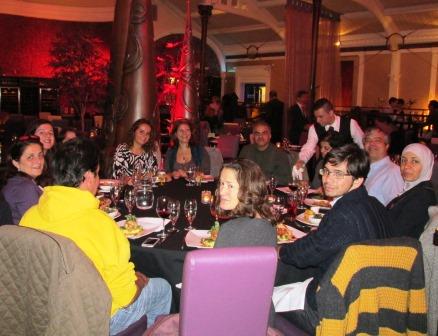Writing Workshop, Dublin
Writing an effective research proposal or paper
RESCAP-MED training for researchers
Dublin, 16-18 Sept 2013
Course facilitators: Kathleen Bennett, Peter Phillimore, Simon Capewell/Martin O’Flaherty, Julia Critchley.
Outline programme : The training and workshops covered the following topics: targeting a journal, getting started, analysing abstracts, writing an abstract, outlining, drafting, and dealing with feedback from reviewers. There will be some writing and discussion activities.
The learning outcomes: At the end of the course participants had learnt how to:
- Recognise the need for scientific paper writing and peer review
- Understand the way in which scientific papers are constructed IMRAD
- Critically evaluate poorly written and well written papers STROBE CONSORT, equator
- Distinguish between the relative worth of journals
- Prepare a paper suitable for publication and employ the knowledge gained to get a paper published
- Understand the way in which grant proposals are constructed
- Distinguish between poorly and well written grant applications
Summary:
There were 9 participants attending the course from the participating countries: Palestine (n=2), Lebanon (n=2), Jordan (n=2), Turkey (n=3). The range of participants included junior, mid-career and senior researchers working in different areas of research. The lectures and workshops enabled the concepts and ideas of writing for publication and grants to be explained as well as practical hands-on experience of writing.
The first day was an introduction to writing for publication, including how to get started by finding out who the intended audience is and which journal to target. This was followed by structures for writing, including the standard IMRD (Introduction, Methods, Results and Discussion). Titles and abstracts are an important part to any writing as they are usually the initial part that an audience will read. A workshop on writing an abstract followed in the afternoon, which was very useful and the group enjoyed (thanks to Martin for organising!). One of the participants (Abla) also presented on the first afternoon on the challenges of writing in English when it is not your first language. This provided a very stimulating talk and discussion afterwards.
The second day focused more on the specific parts of paper writing, starting with the introduction. There were short workshops after each lecture on reviewing and appraising the sections of selected papers, mainly quantitative, but qualitative papers were also mentioned. Lectures on the methods, results (both quantitative and qualitative) and discussion sections of papers followed, with a final section on cover letters, authorship and responding to reviewer feedback, which was useful for all.
The final day moved on to grant writing, starting with the similarities and differences from writing for publication. The general structure of grant applications was described, followed by a workshop reviewing an unsuccessful application (one of our own!) to look at the possible reasons why it might have failed. A session on what reviewers are looking for when reviewing grants was presented next, followed by a talk on EU funding sources given by the research office in Trinity College Dublin. This was partly focused on the participants and countries they would be applying from and included the Marie-Curie programmes for training and fellowships. The final part of the day was to outline a grant proposal following a hypothetical call for funding applications. Participants worked in groups and devised some novel studies for which to apply for funding.
Overall, the feedback from the course was very positive, and a further more advanced level writing course is to be organised for the future. Materials from this writing course are available here (to follow).

Workshop participants and lecturers enjoy a night out at the Fire Restaurant in Dublin

